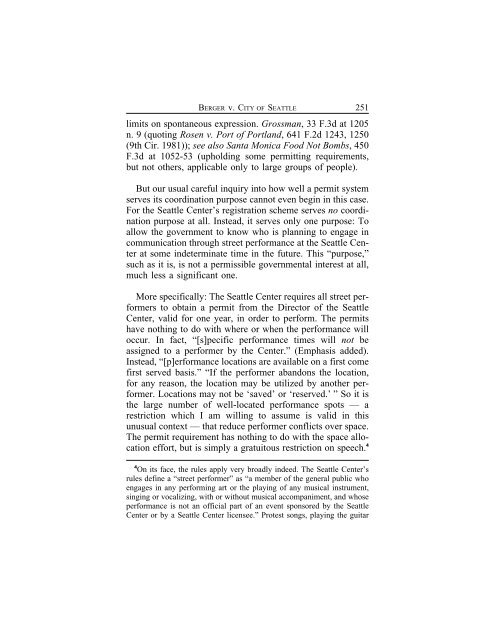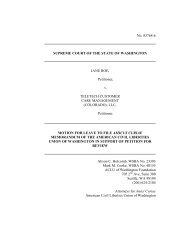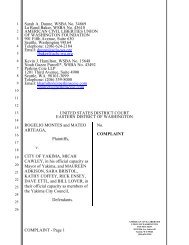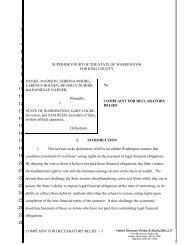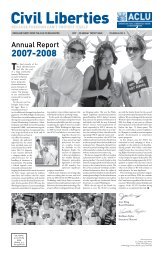BERGER v. CITY OF SEATTLE - ACLU of Washington
BERGER v. CITY OF SEATTLE - ACLU of Washington
BERGER v. CITY OF SEATTLE - ACLU of Washington
You also want an ePaper? Increase the reach of your titles
YUMPU automatically turns print PDFs into web optimized ePapers that Google loves.
<strong>BERGER</strong> v. <strong>CITY</strong> <strong>OF</strong> <strong>SEATTLE</strong><br />
251<br />
limits on spontaneous expression. Grossman, 33 F.3d at 1205<br />
n. 9 (quoting Rosen v. Port <strong>of</strong> Portland, 641 F.2d 1243, 1250<br />
(9th Cir. 1981)); see also Santa Monica Food Not Bombs, 450<br />
F.3d at 1052-53 (upholding some permitting requirements,<br />
but not others, applicable only to large groups <strong>of</strong> people).<br />
But our usual careful inquiry into how well a permit system<br />
serves its coordination purpose cannot even begin in this case.<br />
For the Seattle Center’s registration scheme serves no coordination<br />
purpose at all. Instead, it serves only one purpose: To<br />
allow the government to know who is planning to engage in<br />
communication through street performance at the Seattle Center<br />
at some indeterminate time in the future. This “purpose,”<br />
such as it is, is not a permissible governmental interest at all,<br />
much less a significant one.<br />
More specifically: The Seattle Center requires all street performers<br />
to obtain a permit from the Director <strong>of</strong> the Seattle<br />
Center, valid for one year, in order to perform. The permits<br />
have nothing to do with where or when the performance will<br />
occur. In fact, “[s]pecific performance times will not be<br />
assigned to a performer by the Center.” (Emphasis added).<br />
Instead, “[p]erformance locations are available on a first come<br />
first served basis.” “If the performer abandons the location,<br />
for any reason, the location may be utilized by another performer.<br />
Locations may not be ‘saved’ or ‘reserved.’ ” So it is<br />
the large number <strong>of</strong> well-located performance spots — a<br />
restriction which I am willing to assume is valid in this<br />
unusual context — that reduce performer conflicts over space.<br />
The permit requirement has nothing to do with the space allocation<br />
effort, but is simply a gratuitous restriction on speech. 4<br />
4 On its face, the rules apply very broadly indeed. The Seattle Center’s<br />
rules define a “street performer” as “a member <strong>of</strong> the general public who<br />
engages in any performing art or the playing <strong>of</strong> any musical instrument,<br />
singing or vocalizing, with or without musical accompaniment, and whose<br />
performance is not an <strong>of</strong>ficial part <strong>of</strong> an event sponsored by the Seattle<br />
Center or by a Seattle Center licensee.” Protest songs, playing the guitar


